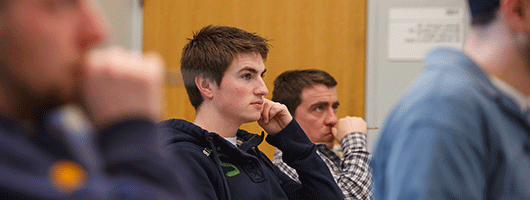 Speech | SPCH
Speech | SPCH
P Prerequisite | C Co-requisite | R Recommended
I Fall Semester | II Spring Semester | S Summer Session/s
- SPCH-B 399 Human Behavior and Social Institutions (3 cr.) P: SPCH-S 121 Public Speaking. This course introduces students to the perspectives of the social sciences in building an understanding of our world. It will also focus on the individual in relation to and as a product of that social world. It will develop in students an appreciation of the processes of social interaction and emphasize the analytic frameworks and techniques social scientists use to explain the causes and patterns of individual and institutional behavior.
- SPCH-S 121 Public Speaking (3 cr.) Theory and practice of public speaking; training in thought processes necessary to organize speech content; analysis of components of effective delivery and language.
- SPCH-S 122 Interpersonal Communication (3 cr.) Introduction to core communication concepts and processes of face-to-face interaction from the perspective of communication competence. Analyzes variability in the design, production, exchange, and interpretation of messages in relational, family, professional, and cultural contexts.
- SPCH-S 160 Speech Correction for Classroom Teaching (3 cr.) Classification and methods of therapy for speech and hearing disorders; emphasis on rehabilitation that can be given by teacher to children in classroom situations. Primarily for education majors.
- SPCH-S 205 Introduction to Speech Communication (3 cr.) P: SPCH-S 121. Overview of fundamental theoretical and methodological issues involved in the social scientific and critical study of human communication. Analyzes influences on and impact of communication in dyadic, group, public, and mediated contexts.
- SPCH-S 223 Business and Professional Communication (3 cr.) P: SPCH-S 121. Examines organizational communication with emphasis on skills acquisition. Developed skills including interviewing, group discussion, parliamentary procedure, and public speaking.
- SPCH-S 228 Argumentation and Debate (3 cr.) P: SPCH-S 121. Reasoning, evidence and argument in public discourse. Study of forms of argument. Practice in argumentative speaking.
- SPCH-S 229 Discussion and Group Methods (3 cr.) P: SPCH-S 121. Leadership and participation in group, committee, conference, and public discussion; logical and psychological aspects of group process.
- SPCH-S 321 Rhetoric and Modern Discourse (3 cr.) P: SPCH-S 121 or SPCH-S 205.
Topical analysis of the constituents of traditional rhetorical theory; application of rhetorical principles to the study of selected modern discourse.
- SPCH-S 322 Advanced Interpersonal Communication (3 cr.) P: SPCH-S 121, SPCH-S 122. Advanced consideration of communication in human relationships. Emphasis given to self concept, perception, verbal language, nonverbal interaction, listening, interpersonal conflict and communication skills in family, social, and work situations.
- SPCH-S 324 Persuasive Speaking (3 cr.) P: SPCH-S 121 or SPCH-S 205. Motivational appeals in influencing behavior; psychological factors in speaker-audience relationship; contemporary examples of persuasion. Practice in persuasive speaking.
- SPCH-S 334 Computer-Mediated Communication (3 cr.) This course examines the theory and practice of computer-mediated communication. Students will investigate the interpersonal, organizational, and political effects of communicating through mediating devices. They will also discuss the social, legal, and ethical consequences of new communication technologies.
- SPCH-S 336 Current Topics in Communication (3 cr.) P: SPCH-S 121 or SPCH-S 205. Extensive analysis of selected problems in contemporary speech communication. Topics vary each semester and are listed in the Schedule of Classes. May be repeated once for credit.
- SPCH-S 380 Nonverbal Communication (3 cr.) P: SPCH-S 121 or SPCH-S 205. Provides a conceptual and theoretical foundation for understanding how nonverbal communication influences perceptions of others and the ways in which nonverbal communication reflects emotions, status, sex-roles, etc. The course explores how nonverbal communication facilitates retention, comprehension, and persuasiveness of verbal information, including the ability to detect deceptive communication.
- SPCH-S 398 Independent Study in Speech Communication (1-3 cr.) P: SPCH-S 121 or SPCH-S 205, junior standing and approval of instructor. Independent study or practicum experience. Projects must be approved by faculty member before enrolling. Repeatable up to a total of 6 credits.
- SPCH-S 400 Senior Seminar in Speech (3 cr.) P: SPCH-S 205. Study of problems and issues in rhetoric and communication. Topic varies.
- SPCH-S 405 Human Communication theory (3 cr.) P: SPCH-S 121, SPCH-S 205, or consent of instructor. Survey of contemporary theories of human communication with emphasis on the nature of theory construction; contributions of allied disciplines to communication theory.
- SPCH-S 421 Speech Criticism (3 cr.) P: SPCH-S 121 or SPCH-S 205. Rhetorical criticism exemplified by selected studies, ancient and modern; development of contemporary standards and methods of appraisal.
- SPCH-S 427 Cross Cultural Communication (3 cr.) P: SPCH-S 121 or SPCH-S 205. A survey study of national, cultural, and cross cultural persuasion in theory and practice.
- SPCH-S 440 Organizational Communication (3 cr.) P: SPCH-S 121 or SPCH-S 205. An examination of internal and external communication in business and other professional organizations, with emphasis upon theory, techniques, practices, goals, and the social environment in which such communication exists.
- SPCH-S 444 Political Communication (3 cr.) P: SPCH-S 121 or SPCH-S 205. Examination of communication in political campaigns and social movements in the age of television. Campaign topics include speech making, advertising, news coverage, and debates. Case studies in social movements, including anti-war and anti-nuclear protest, civil rights, contemporary feminism, and the New Right.
- SPCH-S 450 Gender and Communication (3 cr.) P: SPCH-S 121 or SPCH-S 205. Examines the extent to which biological sex and gender role orientation stereotypes influence the process of communication. Focuses on gender differences in decoding and encoding verbal and nonverbal behavior, development of sex roles, cultural assumption and stereotypes regarding gender differences in communication, and analyzes how the media present, influence, and reinforce gender stereotypes.